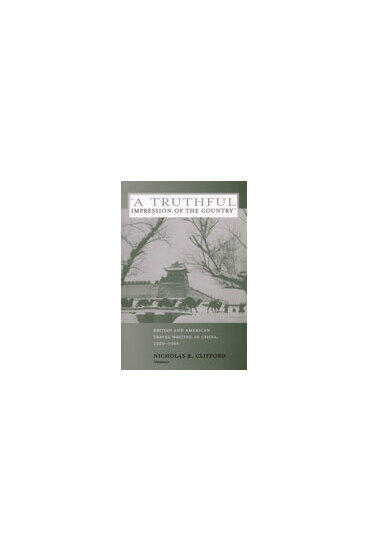"A Truthful Impression of the Country"
British and American Travel Writing in China, 1880-1949
An examination of the writings of travelers to China in the late nineteenth and early twentieth centuries
Description
"A Truthful Impression of the Country" spans a period of roughly seven decades in China, from the late nineteenth century through the first half of the twentieth.
Nicholas R. Clifford argues that, for a variety of reasons, travel accounts during this time claimed a particular kind of veracity that distinguished them from the work of other writers--scholars, journalists, diplomats, policymakers, or memoir-writing expatriates--who also sought to represent an unfamiliar China to the West. Yet even as the genre claims to be a "truthful impression," it contains an implicit warning that the traveler's own sensibility enters into the account and into the representation of the unfamiliar and the exotic.
"A Truthful Impression of the Country" will appeal not only to those interested in the broad phenomenon of imperialism but also to those interested in cultural studies and post-colonialism. It will likewise prove accessible to the general reader exploring Sino-Western interactions or in travel writing as a particular genre.
Nicholas R. Clifford is College Professor Emeritus, Middlebury College. He is also the author of the novel The House of Memory and of the monographs Shanghai, 1925: Urban Nationalism and the Defense of Foreign Privilege and Spoilt Children of Empire: Westerners in Shanghai and the Chinese Revolution of 1925--1927.
Nicholas R. Clifford is College Professor Emeritus, Middlebury College. He is also the author of the novel The House of Memory and of the monographs Shanghai, 1925: Urban Nationalism and the Defense of Foreign Privilege and Spoilt Children of Empire: Westerners in Shanghai and the Chinese Revolution of 1925--1927.
Reviews
". . . beautifully written volume. . . . While Nicholas Clifford nods in the direction of 'scholarship' on travel from the field of literary criticism, he is ultimately less concerned with discourse analyses or with the biographies of travel writers (although these are impossible to ignore) than with the people and places observed. This, then, is a book about China from the last decades of the Qing dynasty through the founding of the People's Republic, not solely about the 'Western representations' of same."
- Joshua A. Fogel, Institute for Advanced Study
—Joshua A. Fogel, Institute for Advanced Study, American Historical Review, October 2002

